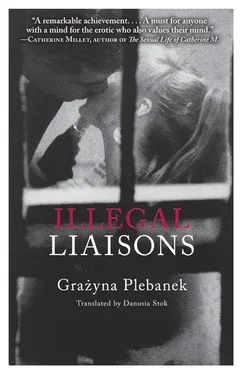Now, Jonathan turned to the table and began to tap at the keyboard. The Pavlov Dogs didn’t romanticise beginnings; they lived in constant continuity; their lives were continuous. And when there was no constancy they allowed something else to take its place. Such was the law of nature, a dog’s law.
SOME TIME AGO,when Latin American literature was in fashion, Jonathan found the verbosity of its prose annoying. He’d been a fan of Nabokov then, of his precision, spiced with an ironic style. Now Love in the Time of Cholera drew him in like music pulsating in his belly. He asked his students what they thought of Márquez and saw that his admiration alone didn’t render Márquez objectively admirable. Ariane said she’d already been through it – just like bell-bottoms. Jean-Pierre sniffed at the lack of refinement in the overly long stories. Geert, a poetry lover, mumbled that so many words between two covers overwhelmed him. Only Kitty admitted that Latin American novels were not a bad vintage.
“Because what’s so literary about the sentence: ‘He finally understood something that, without knowing it himself, he had felt numerous times before: that one could at one and the same time and with equal pain, love many women simultaneously, without betraying any’?” asked Jean-Pierre.
“That’s not any good.” Ariane settled herself more comfortably on the chair.
“In what way?” asked Jonathan.
“It’s too …”
“Immoral?” Kitty broke in.
Ariane shook her head as though something buzzed around her.
“Too simple! Simple as …”
Jonathan was about to throw in the missing word but realized he didn’t know the English word for “cep” [blockhead].
“Didn’t I say so?” Jean-Pierre took possession of another chair and turned it into an elbow-rest.
“What’s simple about it?” Kitty was surprised.
“It’s a round sentence that doesn’t clarify anything,” snorted Ariane. “Where is human emotion?”
“In the rest of the book?” risked Jonathan.
“What I mean,” Ariane seemed irritated by something, “is it lacks life’s reality.”
“Literary novels aren’t nonfiction,” muttered Jean-Pierre.
“Reality is integral to the story,” she explained almost angrily.
Jonathan thought about it afterward when sitting in church waiting for Andrea. But only for that moment because next they lay on the carpet in her living room, Jonathan with his hands around her waist, Andrea snuggled in the saddle of his hips. As she raised herself he took her apple-shaped backside in his hands. He adored her sticking it out; he could admire her pussy for hours.
On his way home, he decided to keep both Andrea and Megi. He wanted them both; the symbiosis was essential to him. Vibrating with love, he thought about the chain of sexual moves – he licks Andrea, Megi sucks him, Andrea Simon, and he, Jonathan, takes Megi from behind.
In all this, he felt wanted, desired, and loved. When he left home, Megi admired him; when he went to Andrea’s, she huddled up to him. He wallowed in caresses, blossomed in their love, discovering ever better sides to himself. People he knew and people he didn’t know flocked around him now, women accosted him with their eyes, men phoned about professional matters until he was afraid that one day he would wake up and find that it was all too good to be true.
At such moments, when he was horrified by how far he’d blundered, he tried to weigh out the failure of his “real” relationship – or at least the one that others considered as such – his marriage. And yet the word “failure” didn’t fit because although he had turned his world upside down in his thoughts, undermined its foundations, and vigorously thrown everything away to be with Andrea, in reality he defended that world. He didn’t even think of leaving Megi – his best friend, his family. And under no circumstances his children. No such script existed.
Jonathan thought that the contrasts provided by the evening were the stuff of writers’ dreams. The three parties he and Megi had attended were like going from one funfair mirror to another, one making you thin, the next making you fat.
They started with a party held by a couple of Megi’s young colleagues. The hosts were good-looking, served imaginative dishes, made sure their guests had enough to drink; their fair-haired daughter played with a fattish Golden Retriever. After an hour, Jonathan had said practically all that could meet with favorable answers. When the conversation moved to comparing life in Belgium to that in their fatherland – with an emphasis on the superiority of cucumber soup over the local speciality, carbonnade – Megi leaned over and whispered in Jonathan’s ear: “Can’t they see that there’s no conflict between liking what’s here and what’s there?”
“They’re defending their own yard.” He shrugged.
“Brave Snail that kept to Polish soil,” she snorted.
“What snail?”
“Required reading. The peasants resisting foreign powers in the nineteenth century. You were doing Shelley at the time.”
Next was a pub – somebody from Megi’s work, who’d been transferred to another EU country, was holding a goodbye do. Jonathan stepped into a world of cigarette smoke and tipsy men with marks left by their wedding rings. Seeing some dancers place their hands on the intimate parts of their partners, Jonathan signalled to Megi that it was time to go.
“If that was hell and the other was heaven,” he muttered, “what’s in store now?”
Simon, the host of the third party that evening, had not omitted to invite them this time. Andrea greeted them at the threshold. Jonathan was speechless, she looked so beautiful in her tight dress; which is why he was relieved that, after taking their coats, she mingled with the crowd.
The apartment seemed entirely different than the one he knew from their secret trysts. He had generally put the meticulous appearance of the place down to Simon; now he was unpleasantly surprised to discover that the bourgeois love of order was no stranger to his hostess either. The food was served in family porcelain, the knives and forks arranged in neat rows, next to which lay ironed fabric napkins.
“Most ambitious,” muttered Megi, squinting at the cutlery trestles that had no right to be there because everyone was walking around carrying their plates.
Despite the pomposity, the guests were circulating casually, raising serious issues in the kitchen, making drunken passes on the dance floor, petting each other and smoking on the balcony. The door handle to the bathroom was loose so that women went in pairs – one went in, the other stood on guard. It occurred to Jonathan that they always went to pee together, and that the lock must have broken that day because the previous day, when Simon had returned from London, it had still been working.
Above the heads of the other guests he caught sight of Andrea dancing with the journalist who’d been unpleasantly surprised when Jonathan had lied that he’d learned English in Poland. Jonathan turned and went out onto the balcony. He helped himself to a cigarette from a stray pack and blew the smoke into the air. A moment later, he heard a creak – in the balcony door stood Andrea.
He glanced at her over his shoulder then stared at the street full of respectable apartments. Suddenly he felt her fingers on his lips. He backed away but he’d already picked up the smell – the smell of her pussy.
Anger clenched his jaws, but his cock swelled in his trousers.
“Kiss it,” she ordered.
“Megi?” calls Martyna. “Have you been here long? I didn’t see you!”
“I didn’t see you either.” Megi stifles a yawn. “Where were you hiding?”
Читать дальше












